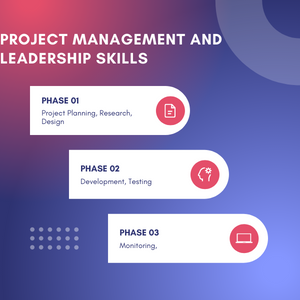 |
Project Management and Leadership Skills |
The leadership development level of a project manager is important to a successful project. Effective leadership skills must be used as needed over the project life cycle.
Project managers are responsible for project delivery and consequently are uniquely placed to make a positive or negative impact. Whilst understanding project management methodologies, tools, and techniques is important, the critical test is being able to apply them in practice. This is where leadership skills and behaviours become critical -- as the project manager leads the project team to meet the objectives
Project Management and Leadership: Equal Partners for Project Success
The Four Project Management Processes of Leadership and Management
“Leaders are people oriented, whereas managers are task oriented. Leaders inspire, whereas managers organize.” - The Realities of Management: A view from the Trenches, Royce L. Callaway
We as project management professionals are all aware of the management aspects of our profession. These include the tasks, processes, and sequences of steps that we all know by heart. However, client feedback and our own self-evaluations or “lessons learned” tell us that we should be addressing an often neglected thou equally important demand of our profession. That demand is Leadership.
Why the Sudden Emphasis on Project Managers as Leaders - Why Is Management Not Enough?
Well, let us look at project management in today's world. I believe we can all agree that the profession of Project Management is continuing to increase in complexity. We regularly are called upon to supervise projects that are global in nature. They involve different cultures, nations, and industries. These increasingly complex projects require budgets totalling millions of dollars.
Therefore, it seems like the world continues to get smaller, projects will continue to get larger. Our inventory of skills needs to increase as well. One skill that has always been over-shadowed by our emphasis on management is Leadership. Oh sure, we all say we practice both and some of us even say that we are good at both. But are we as good as we may think? Let us compare the two and find out while we evaluate ourselves in the process.
Leadership vs. Management
Most people talk as though leadership and management are the same thing. Fundamentally, they are very different. Unfortunately, many people do not understand this.
When people notice that this blog is about Project LEADERSHIP, they always ask about the difference with Project MANAGEMENT. In this clip I will give it a shot; explaining the difference between project management and project leadership as I see it. Many confuse when you should manage and when should you lead. These are the two key roles to play on the stage of business is leader and manager. Discover the essential differences between great leaders and managers.
‘’Throughout life, we will be called to play many roles. Two of the most important work roles relate to that of leader and manager. Some leaders cannot manage— some managers cannot lead." - Murray Johannsen
What Are the Primary Objectives of Management and Leadership?
Simply put, Management is charged with Producing and maintaining a degree of Predictability and Order. Leadership on the other hand, is charged with Producing Change. Let us examine what is necessary to accomplish these objectives.
A summary of our Project Management and Leadership responsibilities can be condensed into what I call the four processes of Management and Leadership. They are:
- Creating an Agenda
- Developing a Team
- Execution of the Agenda
- Evaluation of the Outcome
Can a Project Manager Be a Servant Leader?
Some leaders have put the needs of their followers first. For example, the motto of the Los Angeles Police Department, "To Protect, and Serve." reflects this philosophy of service. One suspects these leaders are rare in business.
A project manager should exhibit two types of leadership as described earlier in this article. These are transactional and transformational. The leader should guide the team members by identifying their roles and responsibilities for the project. In addition, he should inspire the team members to successfully complete the project tasks for the good of the project. "The best project managers are outstanding leaders. They have vision, they motivate, they bring people together, and, most of all, they accomplish great things
Project managers must have integrity-honesty and trustworthiness. A key success factor is getting members of a team to trust each other and trust the project manager in order to work well with each other (Martin, 1976, p.45). When indecision or conflict arises, if the project manager is considered to have integrity, the others will accept his actions more easily. “He will be regarded as having made the decision that best serves the interests of the project and harmony will prevail" according to Martin (1976, p.45).
Other key characteristics for a project manager include alertness, quickness, good listening, imaginative versatility, and flexibility. Martin (1976) explains, “The project manager must be ready at any time to modify any existing plan for a better one".
Stanley E. Portney (2001, p.307) provides ten tips for project managers:
- Be a why person
- Be a can-do person
- Do not assume
- Say what you mean; mean what you say
- View people as allies, not adversaries
- Respect other people
- Think big picture-keep perspective
- Think detail
- Acknowledge good performance
- Be both a manager and a leader
Some professors like to say, "Managers are decision makers." but that doesn't seem quite right. A better description is, "Executives are decision makers— managers are problem solvers." However, some things some things should be managed, and others should not. People should not be managed—it implies we threat them like a thing.
"I don't like to be managed. But if you lead me, I'll follow you anywhere." — A comment heard in the halls of a large corporation
Leader’s focus more on:
- Vision
- Inspiration
- Persuasion
- Motivation
- Relationships
- Teamwork
- Listening
One can add to the list activities such as:
- Counselling,
- Coaching,
- Teaching,
- Mentoring
According to Frank P. Saladis (PMP), if you observe leaders who are successful, you will probably note that they have surrounded themselves with very competent people who are leaders themselves; people they can trust and discuss sensitive issues with and ask for advice. Many leaders have mentors who act as sounding boards to help them think through problems and decisions. I read a statement by Bill Cosby that really has a very good message for leaders. He said, “I don’t know what the key to success is, but the key to failure is trying to please everyone. I believe that effective leaders, even if they never read or heard that quote, make it a point to avoid failure by not trying to please everyone. They know their limitations or the boundaries they must work within. They have a vision, a mission, and a desire to achieve their objectives and find ways to achieve them.
I am sure a major component would be the ability to “enable others. Leaders achieve success by providing direction and then allowing others to act. When things become difficult, the leader looks for leadership from within the team. Here is where the strength is. True leaders know the value of the team and, regardless of leadership style; their success depends on the collective knowledge and abilities of the team. Strong leaders gain their strength from their teams and know when to ask for help. Asking for help is not a sign of weakness; it is a sign of respect and trust and true leadership. Many leaders believe that asking for help is a sign of weakness. In my opinion, it is this belief that is the real weakness. The ability to ask is a sure sign of both leadership and humanity.
Frank P. Saladis (PMP) is Senior Consultant with International Institute for Learning, Inc. He has been involved in the development of standardized Project Management Guidelines (PMGs) for the AT&T Corporate Information Technology Services (Corporate ITS) organization and is the author of the Project Evaluation Review Process (PERP). He is the former President of the NYC PMI Chapter).
Leaders are developed and not born!
Positive Leadership can be born out of experience and a sincere heart for both the people and the project (work to be done). It is not an appointment. It is a developed way of life.
Truly effective managers know that different situations and indeed different individual personality styles require different management styles. Any effective sports coach knows that a team about to win a major championship will require a different form of motivation than one that is fighting to survive relegation in their division. Effective managers adapt their management style to suit the circumstances that they encounter, and preferably, the circumstances that they anticipate may arise, i.e., they are proactive rather than reactive.
Management Styles
There exists two sharply contrasting styles will be broken down into smaller subsets later:
- Autocratic
- Permissive
Each style has its own characteristics:
- Autocratic: Leader makes all decisions unilaterally.
- Permissive: Leader permits subordinates to take part in decision-making and gives them a considerable degree of autonomy in completing routine work activities. Combining these categories with democratic (subordinates are allowed to participate in decision-making) and directive (subordinates are told exactly how to do their jobs) styles give us four distinct ways to manage:
- Directive Democrat: Makes decisions participatively; closely supervises subordinates.
- Directive Autocrat: Makes decisions unilaterally; closely supervises subordinates.
- Permissive Democrat: Makes decisions participatively; gives subordinates latitude in carrying out their work.
- Permissive Autocrat: Makes decisions unilaterally; gives subordinates latitude in carrying out their work.
Related Articles

|
Gain Report - Nigeria: Crop updateReport Highlights: Nigeria's grain production this year is up slightly from the average crop of 2010. Farmers increased average and rainfall patterns were near ideal for the growing season. The arrival of the new crop in the market has not brought any respite to poultry producers as grain prices [Read more]
|
Posted: 15 years ago |

|
Four Ways to Improve Company Culture and Increase Your Company’s Bottom LineThere are a few things to always pay close attention to in a company, like your employees’ salaries, morale in the office, understanding of vision and many more. But one aspect of your company’s daily activities that need to be reinforced constantly is the company culture. This is b [Read more]
|
Posted: 7 years ago |

|
Nigeria Intensifies Protection to Grow Its Sugar SectorThe Government of Nigeria has banned imports of packaged sugar, granulated and in cubes, beginning January 2013. Nigeria’s Trade and Investment Minister, Dr. Olusegun Aganga, said this was in line with the Nigerian Sugar Master Plan which aims at achieving self-sufficiency in the country&rsquo [Read more]
|
Posted: 14 years ago |


